Archive for June 2020
PEN Journey 33: Senegal and Jamaica: PEN’s Reach to Old and New Centers
PEN International celebrates its Centenary in 2021. I’ve been active in PEN for more than 30 years in various positions and now as an International Vice President Emeritus. With memories stirring and file drawers of documents and correspondence bulging, I am a bit of a walking archive and have been asked by PEN International to write down memories. I hope this personal PEN journey will be of interest.
A few days before I flew out to Dakar, Senegal for a PEN conference in November 2004, my youngest son, a Marine in Iraq, called and told my husband and me that we would not hear from him for a while. We knew, without being told, that the U.S. and British troops were likely about to return to Fallujah, the center of the insurgency. Civilians there had been advised to get out of the city, and they were leaving.
On the opening day of the PEN conference in Dakar, November 7, 2004, the battle for Fallujah began. The headlines in the newspapers in Dakar were about the civil war raging in neighboring Ivory Coast so I was not reading about Iraq during the five-day PEN Africa meeting. In 2004 there were no iPhones or phone news feeds and rare coverage of the Middle East was on the evening news. I was quietly attentive each day and prayerful and focused on PEN’s work.
I have modest notes from the first PAN Africa conference, but I have some of my most vivid memories, most particularly of the people I met and of my first trip to Gorée Island just off the Senegalese coast opposite Dakar, a place of its own historic upheaval. Gorée Island was the site of the largest slave-trading center on the African coast from the 15th to the 19th century, ruled successively by the Portuguese, Dutch, English and French. The dungeons and portals to the sea where men and women and children were sent out in chains still stood along with the stucco houses of former slave traders.
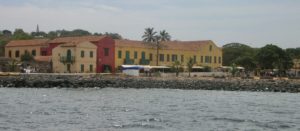
Gorée Island, site of slave trading in 15-19th centuries, off coast of Dakar, Senegal
A tall Gambian doctoral student assisting Senegalese PEN guided a few of us around Gorée. Fluent in French, English and Spanish, he was writing a doctoral thesis on the secrets of history and myth in the epic of Kaabu according to Mandingo oral traditions—clearly a future PEN member. Thoughtful, knowledgeable, he spent the day sharing history. During and after the Dakar meetings, our paths crossed in subsequent PEN conferences and congresses, and we know each other still. Dr. Mamadou Tangara earned his doctorate at the University of Limoges in France shortly after and eventually became the Gambian Permanent Representative to the United Nations. During Gambia’s constitutional crisis in 2016-17, he and other diplomats called for the president to step down peacefully; he was dismissed, but when power changed hands a few months later, he was reappointed as Minister of Foreign Affairs for the Gambia. The friendship with Mamadou Tangara remains and is one of my many valued friendships from PEN.
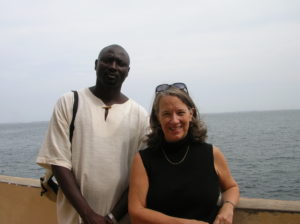
Mamadou Tangara (Gambia) and Joanne Leedom-Ackerman (PEN International Secretary) on Gorée Island at PEN’s 2004 Dakar conference
Mamadou’s mentor at the time was an older Gambian journalist and editor Deyda Hydara, who joined PEN members from more than a dozen African centers in this conference to prepare for PEN’s first PAN African World Congress in Senegal in 2007. The Congress would be PEN’s first in Africa since the 1967 Congress in the Ivory Coast when American playwright Arthur Miller was International PEN President. Though the Gambia didn’t yet have a PEN Center, Deyda was planning on starting one. At the time Deyda Hydara was co-founder and primary editor of The Point, a major independent Gambian newspaper. He was also correspondent for AFP News Agency and Reporters Without Borders and was an advocate for press freedom and a critic of his government’s hostility to the media.
A month after PEN’s Dakar conference, the Gambian government passed a bill allowing prison terms for defamation and another bill requiring newspaper owners to purchase expensive operating licenses and register their homes as security. Deyda Hydara announced his intent to challenge these laws. Two days later on December 16, 2004 Deyda Hydara was assassinated on his way home from work. To this day his murder remains unsolved. The following year Deyda Hydara won PEN America’s Freedom to Write Award posthumously and later the Hero of African Journalism Award of the African Editors Forum.
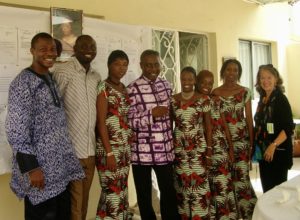
PAN Africa meeting at Senegal PEN offices. PEN L to R: Remi Raji (Nigerian PEN), Mamadou Tangara (Gambia), Mike Butscher (Sierra Leone PEN), Joanne Leedom-Ackerman,( PEN International Secretary) and Senegal PEN assistants
Deyda Hydara was a dynamic voice for writers at the PEN Dakar conference and for the need of PEN’s African centers to work together against repressive press laws.
The theme of the Dakar meeting—“New Partnership for African Development and Culture”—involved coordinating work among PEN’s African centers, including the nomination of a candidate for International PEN’s board at the 2005 Congress in Bled, Slovenia, assistance to dormant African centers and support for creating new African centers. (There are now more than 25 PEN centers in Africa.) Several African PEN centers also committed to working together in fundraising for projects. Remi Raji of Nigerian PEN took on the role of PAN coordinator, and Mike Butscher, executive secretary of Sierra Leone PEN, was the administrator.
PAN (PEN African Network) was relatively new. In 2001 Dr. Vincent Magombe, a Ugandan journalist and member of PEN’s African Writers Abroad Center and member of PEN’s first International Board and Terry Carlbom, PEN’s International Secretary, had taken a trip to visit many PEN African centers in order to promote activity and develop greater participation in Africa. At the 2003 Mexico Congress members from seven of PEN’s African centers met to launch the PEN African Network (PAN). At the 2004 Congress in Norway representatives from twelve African centers came together for a PAN meeting. By Dakar PAN had grown to over a dozen of PEN’s African centers who agreed to help plan the 2007 World Congress in Dakar.
The implementation and heavy lifting for the Congress would depend on PEN Senegal, one of the oldest and best organized of PEN’s centers in Africa. Senegalese PEN had offices, a small theater and even housing for visiting writers, administered by its General Secretary, poet Alioune Badara Bèye. Because the country’s first President (1960-1980) Leopold Sédar Senghor was himself a renowned poet and a Vice President of International PEN, Senegal had a long tradition of support for literature that was unparalleled in most countries.
The Dakar PAN conference opened on the International Day of the African Writer and was coordinated with the Senegalese Writers’ Association and presided over the by the Minister for Culture. The ceremonies included a literary evening along with traditional Senegalese instrumental ensembles and dance.
The planning work for the 2007 Congress got underway the following day in a large meeting room in Senegal PEN’s writers’ compound. As International Secretary, I addressed the gathering and shared a 1922 news report about PEN that began: Le Coeur n’a pas de pays. (The heart has no country) then continued: “Today when many are claiming a clash of civilizations and fear across borders is rising, PEN can continue to demonstrate international fellowship through its literary programs, its work on behalf of imperiled writers, its support of writing in all languages and cultures, its assistance to writers in exile and its development of new centers, particularly in Africa. PEN’s strength is its members, and it is a pleasure to be here with committed writers from some of PEN’s strongest and also PEN’s emerging African centers.”
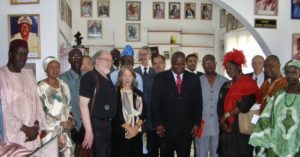
International Day of the African Writer and PEN’s PAN Africa conference at Senegal PEN. Participants, including far left Alioune Badara Bèye, (General Secretary, Senegal PEN), Kjell Olaf (Norweigan PEN), Joanne Leedom-Ackerman (PEN International Secretary/American PEN), Femi Osofisan (Nigerian PEN), Terry Carlbom (Swedish PEN), Senegal Minister of Culture, Deyda Hydara (Gambia), Mike Butscher (Sierra Leone PEN) and other PEN members and officials.
Given the conflict next door in the Ivory Coast and in Iraq, Afghanistan and other areas of the world, it seemed especially important to have these positive actions of fellowship growing. While the PAN conference was serious in purpose, it was also full of comradery. I chaired one session and remember looking out at the table of more than a dozen men and only one woman besides myself. I suggested at PEN’s follow-up conference in Ghana next spring, the centers include their women members. The men looked around the table as though only now noting the imbalance. I smiled. The other woman at the conference Koumanthio Zeinab Diallo from Guinea spoke French, and when the translator repeated my words to her in French, she smiled. C’est vrai! and nodded her approval.
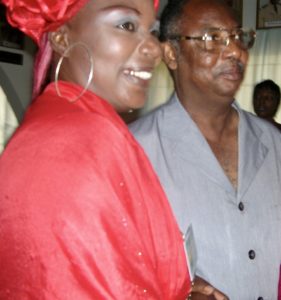
Zeinab Diallo (Guinea PEN) and Deyda Hydara (Gambia) at 2004 PEN PAN Conference in Dakar, Senegal.
Since I had taken on the position of International Secretary, I’d been studying French to get to a passable conversational level. It turned out Zeinab was studying English with the same goal. Mamadou Tangara set up a competition between us which he judged every time the three of us saw each other over the months and years ahead at PEN meetings. Even with our salad of language, Zeinab and I communicated and often laughed together though I don’t think either of us achieved the fluency we wanted. A poet, Zeinab wrote in Pular as well as French. She also worked as an Agricultural Engineer and was a development consultant for the UN Development Programme.
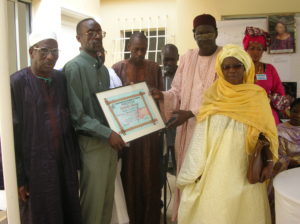
Senegal PEN members including General Secretary Alioune Bedara Bèye presenting tribute posthumously for Senegal writer and member Fatou Ndiaye Sow.
At the PAN conference Senegalese PEN presented an award and tribute to its member Fatou Ndiaye Sow who had passed away just the month before while attending a meeting abroad. A poet, teacher and children’s writer, Fatou had been a friend to many of us and was an early member of PEN International’s Women’s Committee. I read a tribute to Fatou by Lucina Kathmann, a close friend of hers and early chair of PEN’s Women’s Committee.
When I took on the role of International Secretary a few months before, there was already a full agenda underway, and I was grateful to Terry Carlbom, my predecessor, and to Jane Spender, the Administrative Director; Terry also attended the Dakar conference. The next three PEN Congresses were lined up to be developed—Bled, Slovenia in 2005, Berlin, Germany in 2006, and Dakar, Senegal in 2007. Each of these would be hosted by experienced PEN centers so while much work was yet to be done and funds raised for these Congresses and for other activities ahead, solid groundwork had been laid.
A new initiative in those early days as International Secretary was to revive and develop PEN’s presence in the Caribbean. The request originated with the UNESCO representative in Jamaica who was himself a writer. A proposal to explore the possibility was developed in partnership with Canadian PEN’s Executive Director Isobel Harry, who’d spent time in Jamaica, had known one of its most famous residents, musician Bob Marley, and knew numbers of Caribbean writers living in Toronto, some of whom were members of Canadian PEN.
Historically, the Caribbean had been underrepresented in PEN except for the existing Puerto Rican Center and a Jamaican PEN Center that had been active from 1948 until the early 1980’s but had disbanded in 1987.
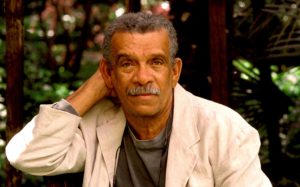
Poet/playwright Derek Walcott, winner 1992 Nobel Prize for Literature. (photo credit: Effigie/Leemage/Writer Pictures)
The Caribbean was enjoying a literary renaissance with events like the CARIFESTA (Caribbean Festival of the Arts), the Calabash Literary Festival and with St. Lucia’s Derek Walcott winning the Nobel Prize for Literature.
In early December, 2004 Isobel and I traveled to Jamaica to meet with writers, professors and UNESCO to determine who and how a PEN center might be launched. PEN Canada had an ongoing relationship with Caribbean writers as did Quebecois PEN, which was working with Haitian writers to help develop a PEN center there. Haitian writer Georges Anglade, who lived part time in Montreal and was the founding President of Haitian PEN, had recently attended the PEN Congress in Tromso, Norway. (Ref Haitian Farewell)
At the minimum, to form a new PEN center at least 20 qualified writers have to come together, sign and agree to commit to the Charter of PEN and propose a reason and program for their center.
Isobel and I flew to Kingston, arriving from the early blasts of winter into the Jamaican sun. It was not hard duty. Over the course of three days we met with a dozen writers, professors, festival organizers, human rights activists and the UNESCO representative Alwin Bully, who was also Chair of the CARIFESTA Task Force. UNESCO’s mandate was to integrate the Caribbean, and Alwin Bully saw PEN as a unifying organization and thought a PEN Center might include writers from many of the Caribbean islands.
Isobel and I met with him several times as well as with the founders and producer of the Calabash International Festival and with journalists from the Jamaica Observer, professors at the University of the West Indies, chief curator of the National Art Gallery, the Vice Chancellor of the University of the West Indies, and the former head of the Human Rights Council. All were enthusiastic about the possibility of a PEN Center.
Colin Channer and Kwame Dawes, founders of the Calabash International Literary Festival, offered to host a planning meeting before the next festival. UNESCO offered to fund the workshop/planning session and include writers from many Caribbean countries. The Vice Chancellor of the University of the West Indies, which had three main campuses in Barbados, Trinidad and Jamaica, said the university could perhaps provide institutional support. Professor Carolyn Cooper of the Department of Literature in English and board member of the Calabash Festival and a writer said she’d be glad to be a founding member and help recruit so that the PEN center had an inclusive group of all types of writers.

L to r: Novelist Colin Channer (photo credit: Allison Evans), poet Kwame Dawes (photo credit: Andre Lambertson), founders of Calabash International Literary Festival, and Professor Carolyn Cooper of the University of the West Indies (photo credit: Isobel Harry)
Florizelle O’Connor, the former head of the Human Rights Council and member of the UN Sub Commission on Human Rights was also enthusiastic about a PEN center. She felt the right to freedom of expression and access to information were issues that needed protecting in Jamaica and the Caribbean.
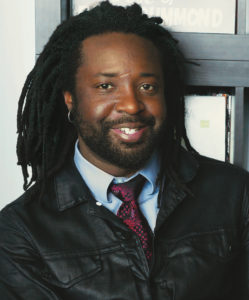
Novelist Marlon James, 2015 Man Booker Prize winner
Questions arose on where a Caribbean PEN center would be located—Jamaica, Trinidad, other? Other writers, including journalists from the Jamaica Observer, emphasized that a center would need equal representation of writers and journalists and no one constituency should be keeper of the PEN flame.
Writers who lived part time in Jamaica and part time in Toronto, New York, London and elsewhere noted that most writers far from home sought ways to keep strong the bonds and identity with the Caribbean; a PEN center could help. Each interview resulted in a list of at least four to six more people to speak with, including later Marlon James, who would eventually win the Man Booker Prize.
At the end of our three-day trip circling Kingston aglow with red, green and gold Christmas lights and swaying palm trees, we concluded a PEN Center would happen. At its best it could bring together writers, journalists and creative people in the islands and provide further access to each other, broaden access to the world of literature and enable writers to present a collective voice for greater impact on issues such as freedom of expression.
The writers would have to decide the questions ahead—who would be eligible, the balance of journalists and creative writers and the diasporic writers whose numbers might exceed the local writers. A large unresolved question was whether the PEN center would be Jamaican PEN as in the past or a pan-Caribbean PEN.
As we left the island to return to our winter, it was agreed the discussions would continue among the writers, including those Caribbean writers in New York, Toronto and London and with UNESCO. A workshop/planning meeting in association with the Calabash Festival and the University would be held, probably in May 2005. Isobel would return.
In 2006 the Jamaica Center was voted into PEN at the Berlin congress and joined over 135 PEN centers worldwide.**
Next Installment: PEN Journey 34: Diyarbakir and Beyond—Finding Byways for Peace
——————-
*Current African PEN Centers: Afar, Afrikaans, Algerian, Egyptian, Eritrean in Exile, Ethiopian, Gambian, Guinea-Bissau, Guinean, Ivory Coast, Kenyan, Liberian, Malawian, Malaysian, Mali, Mauritania, Moroccan, Nigerian, Senegal, Sierra Leone, Somali-Speaking, South African, Togo, Tunisian, Ugandan, Zambian, Zimbabwe
**Current Caribbean PEN Centers: Cuban, Haitian, Jamaican, Puerto Rican
PEN Journey 32: London Headquarters: Coming to Grips
PEN International celebrates its Centenary in 2021. I’ve been active in PEN for more than 30 years in various positions and now as an International Vice President Emeritus. With memories stirring and file drawers of documents and correspondence bulging, I am a bit of a walking archive and have been asked by PEN International to write down memories. I hope this personal PEN journey will be of interest.
PEN is a work in progress. It has always been a work in progress during its 100 years. Governing an organization with centers and members spread across the globe in over 100 countries can be like changing clothes, writing a novel and balancing a complex checkbook all while hang gliding. Perhaps an exaggeration, but not by much.
In 2004 the leadership of President and International Secretary were at the center of the governing structure along with the Treasurer and a relatively new Board. The President represented PEN in international forums. The International Secretary was tasked with overseeing the office and the centers of PEN and with any tasks the President handed over like running board meetings and setting up the agenda for work. The concept was that PEN should be able to elect as President a writer of international stature to represent PEN in global forums but not have the obligation to run the organization. That could be the role of the International Secretary, along with the Board and staff.
When I assumed the role of International Secretary, PEN did not yet have an executive director, though the consensus had built from the strategic planning process that we needed one. Both the President and International Secretary were volunteer, unpaid positions, which meant they were not full time. At the post-Congress board meeting after Tromsø, we agreed to begin a search for an executive director.
I suggested monthly board meetings, which had not been the practice. We could do these by phone, which meant there were only a few hours a day when everyone would be awake. If Judith Rodriguez in Melbourne, Australia could stay up past 11pm and Eric Lax in Los Angeles didn’t mind waking up at 7am, the rest of us—Takeaki Hori in Japan, Sibila Petlevski in Croatia, Eugene Schoulgin in Norway, Elisabeth Nordgren in Finland, Cecilia Balcazar in Colombia as well as President Jiří Gruša when he joined from Vienna or Prague and me in Washington, DC or London—could find our time zone and call in. The technology was not as sophisticated as today, and we didn’t yet use skype so the calls were not cheap, but we began to manage each month.
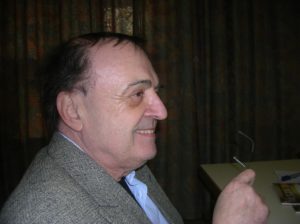
International PEN President Jiří Gruša
As International Secretary, I was in charge of overseeing the office and staff, working with centers on conferences and projects and along with Jiří, liaising with our partners like UNESCO. Administrative Director Jane Spender and I drew up the agenda for each board meeting. I always checked with Jiří to see if he had items to add and to see if he wanted to join the board meeting. I chaired most of the board meetings and much of the Assembly of Delegates at the Congresses. English was not Jiří’s first or second language, and he had other large obligations. During his presidency, he took on the Directorship of the Diplomatic Academy of Vienna, where we held our winter board meetings. This division of tasks between Jiří and me was quite different when the next President John Ralston Saul took on the presidency in 2009, along with Takeaki Hori as International Secretary. John was a much more hands-on President than Jiří. The President and International Secretary were a team and usually agreed between them who would do what.
One of my most important and enjoyable partnerships was with Administrative Director Jane Spender, who was promoted to Program Director for Jane had been instrumental in the thinking and execution of PEN International programs first years. I tried to spend at least a week to 10 days each month in London or on the road for PEN. I was able to finance my travel outside of PEN’s budget. Jane and I worked closely together as we outlined what yet needed to be done in PEN’s move to modernize systems. Each International Secretary had operated in a way that worked for the time. In my tribute to retiring international Secretary Terry Carlbom, I’d noted that early in PEN’s life, around 1924 at a meeting in Vienna, the French representative had turned to the German representative and said, “PEN means Paix Entre Nous (“Peace between us.”).* Members did not always agree with each other and would perhaps even get angry, but the hope was that members would honor and serve that acronym well.
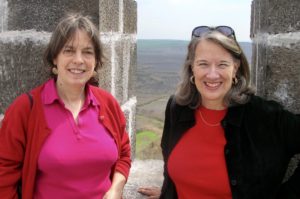
L to R: International PEN Program Director Jane Spender and PEN International Secretary Joanne Leedom-Ackerman at the wall surrounding Diyarbakir, Turkey in March, 2005.
After Terry debriefed me at the PEN Congress in Tromsø, one of my first visits was to Paris to talk with former International Secretary Alexander Blokh, who had held the position for 17 years, to listen to his experience. The times and the demands were changing from Alex’s day as PEN grew and as the world sped up and shrank at the same time with the advent of the internet.
One of my early calls was to George Gawlinski, who had taken PEN through the strategic planning process in Bellagio in 2003 (see PEN Journey 28). George’s advice was that we hire an interim executive director while we did a search for an executive director. He said he happened to know that one of the best in that business was available, a man named Peter Firkin. He could come in, help us get systems in place like employment policies which we didn’t have, a budget which we didn’t have and help set up the systems the office would need to appeal to a first rate executive director and also begin relieving the impossible workload Jane and the staff bore. Jane and I interviewed Peter together. After about twenty minutes (or less), we exchanged relieved glances over the table and knew we had found who we needed for that moment.
A grey-haired New Zealander with wide experience with organizations and a love for books, Peter spoke with the Board and Jiří, and PEN hired him to come in several days a week to begin helping, including assisting in the search process. My notebook of lists had already grown quite full, and now these lists Jane and I allocated among the three of us. One of the big tasks was to develop an overall budget for the organization. The Writers in Prison Committee operated with a budget, but the rest of the organization operated project by project and at the end of the year, a list of expenses and income was recorded. There was not a budget projected forward for the whole organization, rather an accounting of money spent and money received. The only way to draw up PEN’s first budget was to look at what was spent the year before and project forward. The budgeting processes also needed to be set in place. American PEN sent over its financial director to work with the London office for a week with Jane and Peter and the Treasurer Britta Junge Pedersen and bookkeeper Kathy Barazetti. It took a while, but we eventually had a comprehensive, estimated budget for the whole organization.
Another task was to revise our status with the British Charity Commission, which oversaw all charities in Britain. The work of human rights organizations had been regarded as being political in nature, therefore not permitted charitable funds. Some organizations like International PEN had set up charitable trusts—the International PEN Foundation—to raise funds for their educational work. But with a change in the law, human rights organizations were now accepted as a-political. With Peter’s help we found a law firm that could take us through the process to dissolve the International PEN Foundation so International PEN could operate as one charitable organization.
We also found new and highly respected auditors. All these were the nuts and bolts on the continued journey to improve and modernize International PEN. During Terry Carlbom’s tenure as International Secretary, we had gotten rules and regulations and procedures updated and approved and the strategic planning process underway. The tasks and lists to get International PEN operating more efficiently seemed endless, but each day Jane and I checked more items off the lists.
We hired a highly recommended search firm, which Human Rights Watch had used successfully. Jane and Sara made it clear they did not want to be considered for the position of executive director. Jane was made the Program Director and Sara remained the Director of the Writers in Prison Committee. The board set up a committee to oversee the search, to read resumes given us, help set out the tasks and interview questions for finalists and ultimately to interview final candidates. The committee included Eric Lax, Eugene Schoulgin, myself, and Peter Firkin. We consulted closely with Jane and Sara who also interviewed the finalists.
All of this work related to the systems of the organization and were interesting and enjoyable because of the colleagues I was working with even with long hours and sandwiches for dinner at the office. But the most fun was the programs and going out into the world and working with writers. My first trip was to Dakar, Senegal, where one of our oldest African Centers had committed to host the 2007 PEN Congress and was bringing together all the African centers for a conference. One of PEN’s early Vice Presidents had been poet Leopold Senghor, who was also the first President of Senegal. A sentence I wrote and memorized before going there I remember to this day: Il n’a que qelques autre pays dans le monde ou l’ecrivain est plus honore qu’au Senegal. “There are few countries in the world where the writer is more honored than in Senegal.”
In December I left for Jamaica with Canadian PEN’s executive director Isobel Harry. Writers in Jamaica, along with UNESCO’s representative there, wanted to start a PEN Center for the Caribbean.
*P.E.N. acronym stands for Poets Essayists and Novelists; along the way it expanded to Poets Essayist/Editors and Novelists
Next Installment: PEN Journey 33: Senegal and Jamaica: PEN’s Reach to Old and New Centers
PEN Journey 31: Tromsø, Norway: Northern Lights
PEN International celebrates its Centenary in 2021. I’ve been active in PEN for more than 30 years in various positions and now as an International Vice President Emeritus. With memories stirring and file drawers of documents and correspondence bulging, I am a bit of a walking archive and have been asked by PEN International to write down memories. I hope this personal PEN journey will be of interest.
The week before PEN’s 70th World Congress in Tromsø, Norway in the Arctic Circle, my oldest son competed in the Athens 2004 Olympic Games, the only wrestler to qualify for TeamGB (Great Britain). He had dual citizenship and was the first British champion to qualify for the Olympics in wrestling in eight years. In his sport, there was no seeding of competitors; instead, after making weight, each wrestler reached into the equivalence of a hat and drew their first round competitions. True to his history, my son drew the best opponents. As one news commentator noted: “Coming to the mat is Nate Ackerman, born in the US, wrestling for Great Britain, getting his PhD in mathematics at the Massachusetts Institute of Technology…but that won’t help him now as he faces the three-time World Champion from Armenia.” My son lost to the Armenian wrestler. His other opponent was the world bronze medalist from Kazakhstan who went on to win the silver medal at the Olympics. Though my son didn’t win either match, he also didn’t get pinned, and he wrestled nobly. The Olympic Games in Athens was a magical time.

Olympic circles projected in light on the Acropolis at the 2004 Olympic Games in Athens
I was heading to Tromsø with a smile inside, though behind my smile was also a quiet attention that never left me for my youngest son, a Marine, was in Anbar Province, Iraq that summer, patrolling in 120° and alert for IED’s and snipers along the roadside. He had missed his brother in the Olympics and his brother missed being able to talk with him.
As I changed planes in northern Europe, I realized I was going to need a coat in the Arctic Circle and bought a light foldable one at an airport shop which I took to a decade worth of PEN Congresses after. On the plane I reviewed the stack of PEN papers and resolutions.
I was arriving at the Congress having agreed to stand for International Secretary. (See PEN Journey 30). The other PEN member standing was Giorgio Silfer, a poet and playwright and president of Esperanto PEN.
Norwegian PEN hosted over 300 writers, editors, and translators from at least 60 countries for the 70th World Congress whose theme was Writers in Exile—Writers in Minority Languages. The Rica Arctic Hotel where we stayed and met was an easy walk to the small downtown of Tromsø, capital of northern Norway, well above the Arctic Circle and called “the Paris of the North.”
Kjell Olaf Jensen, President of Norwegian PEN, reminded delegates that the Congress themes reflected the literary scene of Tromsø, which would soon join the International Network of Cities of Asylum as the fifth Norwegian city. (This network later developed into the International Cities of Refuge Network (ICORN) in 2006 with PEN’s Writers in Prison Committee as a partner and with the inaugural meeting in Stavanger, Norway.) One of the guiding voices in the exile network Professor Ole Danbolt Mjøs, director of Tromsø University’s Peace Center and President of the Norwegian Nobel Committee, spoke at the Welcome Party Ceremony as did Ole Henrik Magga, President of the Sami Parliament. Half of the estimated 50,000 Sami in the world lived in Norway. Crown Prince Haakon of Norway officially opened the Congress the next day noting, “Freedom of speech is a source of power. If used constructively, it is amazing what speech can do. It can fight corruption, free political prisoners, and make oppressive regimes crumble.”
The two themes of writers in exile and writers in minority languages intertwined throughout the Congress with readings and round tables at cafes and pubs in the midst of Tromsø’s annual International Literary Festival and the International Nana Festival of Aboriginal people. Literary and musical programs included the Sami singer Mari Boine in the Arctic Cathedral and the work of the celebrated but deceased Sami poet, singer, and writer Nils Aslak Valkeapaa. PEN’s programs highlighted some of Norway’s own writers in exile: Mansur Rajih from Yemen, Soudabeh Alishahi from Iran, Islam Elsanov, a film maker from Chechnya, and Chenjerai Hove from Zimbabwe as well as guests Reza Baraheni (Iranian writer living in Canada), Turkish activist Şanar Yurdatapan, and former Russian prisoner and writer Grigory Pasko.
A conference at Tromsø University under the theme “Should Writers Live in Prison?” preceded the Opening Ceremony. Storyteller Easterine Iralu of the “Nagaland nation” addressed the delegates in the main lecture hall: “Every man is a story and every nation is a bristling galaxy of stories. Every nation should be given the right to tell the story by its own story tellers…We are an oral society. Naga writing is an aboriginal achievement.”
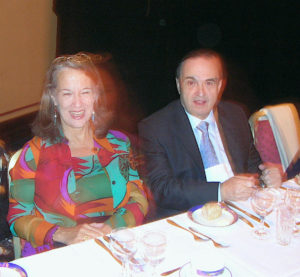
New PEN International Secretary Joanne Leedom-Ackerman and PEN International President Jiří Gruša at 70th PEN Congress in Tromsø, Norway, 2004
In later panels Lebanese novelist Amin Maalouf said, “Poets and writers must reinvent the world. This is not a task to be left to politicians. Is this a century of bombs or poems?” Norwegian bestselling author Jostein Gaarder expanded the questions: “How wide are the ethical horizons of literature and art? The question for writers and artists at the start of the third millennium must be what shift in consciousness do we need? Literature is nothing less than a celebration of mankind’s consciousness. So shouldn’t an author be the first to defend human consciousness against annihilation?”
At his first Congress as PEN International President Jiří Gruša told the delegates, “I myself have experienced persecution and really esteem people who help authors to freedom. I know how vital it is to have somebody outside the prison who cannot be stopped. ” He challenged writers to invent and combine practical and stylistic literary methods “to conquer plagues and pestilence that threaten human, moral and planetary evolutions.” He and the delegates of the Congress condemned recent terrorist attacks on a school in Beslan, Russia which had taken the lives of hundreds of children just a few days before. Jiří also paid respect to poet, Nobel laureate and PEN member Czeslaw Milosz, who had recently passed away. “It is with deep grief that the PEN family sympathizes with the people of Poland. We shall miss him, but his work will continue to inspire people from one end of the world to the other.” Milosz was a member of the Writers in Exile American Branch of PEN.
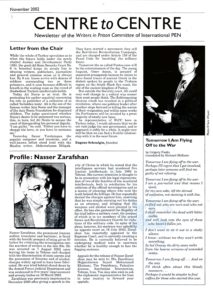
Writers in Prison Centre to Centre newsletter featuring poem by Grigory Pasko, honored guest at 70th PEN Congress and article about prisoner Nasser Zarafshan.
In addition to attending the rich literary panels and discussions, PEN’s Assembly of Delegates passed a resolution that urged authorities to assist in freeing Christian Chesnot and Georges Malbrunot, two French journalists currently held hostage in Iran. Encouraged by Nicaraguan poet Ernesto Cardenal, delegates and participants also signed a petition to the Islamic Republic of Iran demanding that Dr. Nasser Zarafshan’s life be protected and that he be immediately and unconditionally released. Delegates also signed a petition to the President and Government of Russia calling for a multilateral dialogue and an end to the violence in Northern Caucasia and a restoration of civil living conditions in the Chechnyan Republic, including open access so that local and national media could report events in the region. (Chesnot and Malbrunot were released from Iran a few months after the Congress, in late December, 2004. Zarafshan was not released until 2007.)
The Assembly passed resolutions from the Translation and Linguistic Rights Committee (TLRC) urging authorities of the Russian Federation to grant cultural rights to all minorities, including use of regional languages, and the same appeal was sent to authorities in Turkey, Iran and Syria regarding Kurdish language and culture.
Writers in Prison Committee (WiPC) resolutions which the Assembly passed focused on the repression of free expression for writers seeking asylum in Australia, on harassment of certain journalists in Canada, attacks on writers in Chechnya, imprisonments in China and Cuba, censorship and harassment of writers in Egypt, arrests in Eritrea, hostage-taking in Iraq, detentions in the Maldives, killings in Mexico, detention and ill treatment in Myanmar, murder in Nepal, killing and disappearances in Russia, bombings and assassinations in Spain, imprisonments in Turkey, restrictions on the free flow of international writing in the U.S., imprisonments in Uzbekistan and Vietnam, and restrictions on free expression in Zimbabwe.
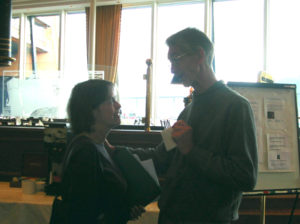
Administrative Director Jane Spender and PEN International Secretary Terry Carlbom at 70th PEN Congress in Tromsø, Norway, 2004
The WiPC resolutions had been discussed at the earlier Writers in Prison Committee meeting where a new chair had been elected from four candidates. Karin Clark of German PEN would replace Eugene Schoulgin, who was stepping down after four years and was running for the Board of International PEN.
At the Assembly of Delegates, Eugene introduced guest of honor, former Russian main case and journalist Grigory Pasko, who told the delegates that “although he had not been able to thank all those who had worked on his behalf while he was in prison, he now would like to thank everyone again and again. Unfortunately he could not now say that Russia had become more democratic, but he would continue to fight to make it so, supported by all his friends in the Assembly hall.”
Election for the Board of PEN included eight candidates for three open positions. Eric Lax (PEN USA West), Judith Rodriguez (PEN Melbourne), and Eugene Schoulgin (Norwegian PEN) joined the Board. Three new centers—Basque, Guatemala and Kosovo—were admitted into PEN.
At his last Assembly as International Secretary Terry Carlbom told the delegates, “Our greatest strength is ultimately our capacity for empathy, compassion and solidarity. Ours is not the solidarity of the collective herd; it is the solidarity of the concerned and caring individual, a solidarity with a fragile world and fragile civilization. And the solidarity that sometimes can provide comfort in the rather lonely process of creative writing…I have been proud to serve.”
At the Congress Terry saw the passage of the final amending resolutions on the Regulations and Rules of Procedure he had dedicated a significant portion of time to as International Secretary. Updating rules and regulations to bring them in line with the changes PEN had made to its governance was not a task for many writers. I was grateful to Terry that these documents were now drafted and a working document for strategic planning was in hand.
The election for Terry’s replacement as International Secretary was between Giorgio Silfer (Esperanto PEN) and myself. Giorgio’s speech to the Assembly was a poem, an unusual and memorable presentation for office. Giorgio was a linguist and a poet and participated actively on the Peace Committee and Translation and Linguistic Rights Committee. I was a novelist and journalist and activist on the Writers in Prison Committee and Women’s Committee. We had both worked with all committees, but we had our corridors and respected each other. My statement was more traditional.
I was elected the new International Secretary of PEN. I glimpsed the work ahead when I sat down with Terry in the hotel lounge after the election. He told me in November I needed to be at Senegal PEN‘s conference with African centers in Dakar in preparation for the 2007 PEN Congress there, and in the spring I was in charge of a conference PEN was holding in Diyarbakir, Turkey with Kurdish and Turkish PEN. Great, I said. Can you show me the budget and program for the Diyarbakir conference? Terry explained that we didn’t have a budget yet, but he offered to continue helping with this conference. I was to learn quickly that unlike the Writers in Prison Committee, the rest of International PEN worked in a more unstructured fashion, without clear budgets but with relationships that usually came through. I began making lists. My tenure as International Secretary would include notebook after notebook of lists of tasks to be done.
A solace as I left that meeting was that I would be working with Jane Spender, Administrative Director, who was smart, a friend, and had gotten PEN through remarkably tight places before. Jane and I both knew that time was not on our side if we didn’t modernize further. I put on my new PEN coat and went for a brisk walk with Jane in the drizzle towards the next venue. PEN International had been asked for the first time by a major funder to provide an evaluation of a major grant. No one before had asked that of PEN, but it would surely be asked more and more in the future. We walked down the wet Tromsø streets considering what was before both of us. We had to figure out how to do an evaluation and much more…
Next Installment: PEN Journey 32: London Headquarters: Coming to Grips
PEN Journey 30: Barcelona: A Surprise
PEN International celebrates its Centenary in 2021. I’ve been active in PEN for more than 30 years in various positions and now as an International Vice President Emeritus. With memories stirring and file drawers of documents and correspondence bulging, I am a bit of a walking archive and have been asked by PEN International to write down memories. I hope this personal PEN journey will be of interest.
I was having lunch with my husband at a Georgetown restaurant in Washington, DC on a Saturday in May, 2004. I was due to fly out the next day for Barcelona to attend International PEN Writers in Prison Committee’s 5th biennial conference, part of a larger Cultural Forum Barcelona 2004. My husband and I were talking about our sons—the oldest was getting a PhD in mathematics and was also training for the 2004 Olympics as a wrestler, hoping to make the British team. (He had dual citizenship.) The younger, recently graduated with an advanced degree in International Relations, had just deployed to Iraq as a Marine 2nd Lieutenant and was heading into a region where the war was over but the insurgency had begun. It was an intense time for our family, yet as parents there was not much we could do except to be there, cheering for our oldest at his competitions and writing letters and sending packages and prayers for our youngest. It was a time when as parents we realized our children had grown beyond us and were taking the world on their own terms.
I was planning to be away for the week in Barcelona where PEN members from around the world were gathering for the Writers in Prison Committee (WiPC) and Exile Network meetings. Carles Torner, PEN International board member, chair of PEN’s Translation and Linguistic Rights Committee and former President of Catalan PEN, had helped arrange International PEN’s participation and funding as part of the Universal Forum of Cultures—Barcelona 2004. This would be the largest WiPC conference to date with delegates from every continent and multiple speakers and side events.
Carles, a poet, fluent in PEN’s three official languages English, French and Spanish, was one of the highly respected, organized and talented PEN members. He’d also been involved in the years’ long reformation of PEN International. As members looked to who could be a strong replacement for the current International Secretary when Terry Carlbom’s term ended in a few months, there was widespread enthusiasm for Carles to stand for the office. I was among the enthusiasts.
My phone rang at that Saturday lunch. International PEN Board member Eric Lax, already in Barcelona for meetings, said he had news and a question; he told me he was calling on behalf of others as well. The news: the Catalan government had also recognized Carles’ talents and had offered him a position as Director of Literature and Humanities Division at Institut Ramon Llull to promote Catalan literature abroad. A father of three, Carles had accepted this paid position which meant he couldn’t stand for PEN International Secretary, an unpaid position. He wouldn’t have the time for both, and there would be conflicts of interest.
Eric asked if I would allow myself to be nominated. A number of members and centers, including the two American centers, were asking, he said. PEN’s Congress where the election would take place was only a few months away in September and nominations were due soon. I was flattered but said no for a number of reasons. Eric asked that I not answer yet, just come to Barcelona, talk with people and let them talk with me.
The International Secretary who worked with the Board and President to run International PEN was not a position I aspired to, but I agreed to come to Barcelona with an open mind. I’d worked with PEN in various roles, including as Chair of the Writers in Prison Committee, for over 20 years. I’d been both inside and outside the reform process that was going on. I understood, at least in part, what PEN was aiming towards and what it would take for this sprawling organization to operate competitively among nongovernmental organizations in the 21st century. I’d sat on boards of several global nonprofit organizations, including Human Rights Watch, Save the Children and the International Crisis Group.
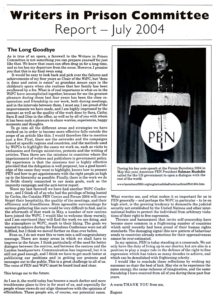
PEN Writers in Prison Committee Center to Center newsletter Spring, 2004
In Barcelona delegates from a number of PEN centers urged me to stand for the office. I asked whether they thought this was the time for an American to take on this leadership role given the controversy over US engagements. “We don’t think of you as American,” some said, perhaps because I’d also lived in Europe for six years during my work with PEN.
I kept my own personal life quiet as I always did, but I did share with Carles, who was urging me to stand, that I had a son in the Marines in Iraq and was committed to him. I didn’t want to get involved in political controversies over the war. “Your focus has always been on freedom of expression,” Carles reminded me. PEN was not an anti-war organization; its focus was on protecting freedom of expression for writers to agree or disagree on issues, not to take political positions unless relating to abuses of human rights.
Mike Roberts, PEN American Center’s Executive Director, was among those encouraging me to stand for the office. He said American PEN would support me however they could with help and advice. We both understood that the organizational models of many American nonprofit organizations could benefit PEN, including the need to have a paid executive director. There was much to be said for the culture of the volunteer which PEN operated in, but given how complex and widespread PEN’s work had grown, it was going to be more and more difficult to compete for funding if there was not a paid professional executive director in the international office in addition to the talented administrative staff and Board of PEN. Certain funders were already telling us as much. Case in point was that Carles, an experienced literary organizer with a family to support, simply could not afford to take on such a demanding position gratis. Eugene Schoulgin, chair of the Writers in Prison Committee, also encouraged me. I left Barcelona thinking deeply about standing for this position which would require significant time and travel.
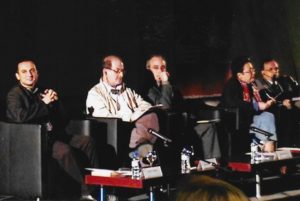
PEN Program at Cultural Forum Barcelona 2004. L to R: Carles Torner, International PEN Board Member and director for PEN conference, Salman Rushdie, President American PEN, Josep Bargalló, First Minister of Catalonia, Dolors Olier, President Catalan PEN
That question absorbs many of my personal memories about the Barcelona conference. I remember the impressive venue and the conversations with friends and colleagues and the many presentations, including by Anna Politkovskaya and an opening talk by Salman Rushdie, the new President of American PEN who called for the US government to open a wider dialogue with the world.
Fortunately, I have papers from the 2004 Writers in Prison Committee meetings. We met over five days and also joined public discussions on literature and memory and the responsibility of writers during times of war. The WiPC continued its focus on issues of impunity and the effect of anti-terror legislation on free expression as documented in PEN International’s two reports issued the previous year.
Joan Smith of English PEN reported that anti-terror legislation was having an impact with democratic countries reacting out of fear to the events of September 11 and either tightening existing legislation or implementing new legislation. Countries such as Cuba were taking advantage for as attention deflected from them, they were cracking down on more dissidents. Countries such as Uzbekistan and other Central Asian countries were using the war against terrorism to win support from the US and western Europe.
Müge Sökmen of Turkish PEN spoke of the danger of silencing dissident voices, a move that would lead to an increase in state terrorism. Since the 9/11 attacks in the US there had been a 20% increase in the number of imprisoned writers. The lifting of Article 8 of the Turkish Anti-Terror Law was welcomed but was in the context of Turkey’s bid for acceptance into the European Union.
Ragip Zarakolu, a Turkish publisher, and Martxelo Otamendi, director of a Basque newspaper, reported to the meeting on their experiences of repression and imprisonment under the anti-terror laws.
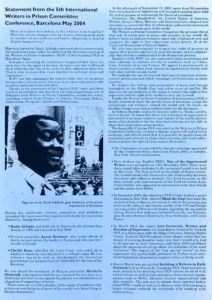
Report on 5th International PEN Writers in Prison Committee Conference as part of Barcelona Forum 2004, including preliminary meetings in London, New York, Istanbul and Ottawa.
Nigerian writer and journalist Kunle Ajibade, who had been sentenced to life imprisonment in 1995 for “conspiring to overthrow the government,” had been freed in 1998 in part because of PEN’s work. But he told the group, “Many of us have been asking, is this what we went to jail for? What has all our struggle come to? A mere clearing of the path for another set of murderers and looters? Right now, a cloud of despair hangs over us.”
Ali Lmrabet, Moroccan journalist, who had been sentenced to three years for insulting the King, also spoke. However, Cheikh Kone, a journalist from the Ivory Coast who’d fled to Australia, had been denied a visa to Spain and so an empty chair was placed at the speaker’s table. Kone had been detained since 2001 in a refugee camp in Australia and was finally released in July 2003 after PEN’s campaign, but the Australian government had invoiced him for $89,000 for the cost of his detention.
Aaron Berhane, an Eritrean journalist who fled to Canada in 2002 reported his situation and the help International PEN’s WiPC and Canadian PEN had given through the Writers in Exile Network. The Network, started in 1994, was currently chaired by PEN Canada and included PEN centers in Austria, Switzerland, Sweden, Norway, England, USA West, and Germany and had helped exiles from Cuba, Sierra Leone and other countries.
A panel with representatives from OSCE, UNESCO, the UN Human Rights Commission, the International Publishers Association (IPA), and the International Freedom of Expression Exchange (IFEX) gathered with PEN to explore cooperation and joint work around issues of freedom of the media, including campaigns on individual cases and pressure on countries to change their laws to conform to democratic standards.
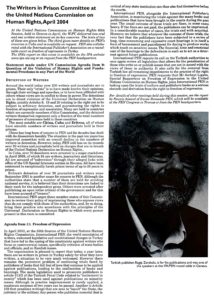
Report on PEN Writers in Prison Committee statement to UN Commission of Human Rights, April, 2004
Ambeyi Ligabo, Rapporteur on Freedom of Expression in the office of the UN Commissioner on Human Rights said he believed the two new threats to freedom and liberty were terrorism and anti-terrorism legislation. He was concerned that countries such as Denmark which professed to be a beacon of democracy were actually denying liberties to their citizens. He was concerned that legislation introduced in some African countries had undermined the progress human rights campaigners had achieved, and he urged collaborative efforts in fighting new threats to free expression.
The WiPC Steering Committee, which consisted of representatives from ten PEN centers, presented its report with suggestions for WiPC headquarters and for the PEN centers on how to expand PEN’s work, its outreach, its funding and its cooperation. A three-year plan was adopted.
The final work of the WIPC conference was an agreement on a campaign calendar for 2004-2005 with an over-arching theme on the issue of Freedom of Expression and Anti-Terrorism.
In accepting PEN’s WiPC statement on freedom of expression from the conference whose theme was “The Value of the Word,” Catalonia’s Minister of Culture declared: “The word is an inspiration for the imagination, a means for peace and a vehicle for freedom. Literature and the word must always be above conflict. PEN has been in the forefront in the fight to secure the value of the word. The value of the word is a guarantee for a better world and more necessary than ever.”
It was agreed the next WiPC Conference would be held in Istanbul in 2006, hosted by Turkish PEN.

La Sagrada Familia—Gaudi Cathedral—in Barcelona, Spain
Before I left Barcelona, I went to visit the Gaudi Cathedral (La Sagrada Familia) which I’d first seen at PEN’s 1992 Barcelona Congress where I’d been so impressed by its majesty and complexity, I wanted to return. Architect Antoni Gaudi had originally planned a cathedral with 18 Gothic spires, but he got hit and killed by a trolley before his elaborate design was realized. Over 100 years later, the cathedral was still unfinished. Gaudi had applied for a construction permit in 1885 but no one ever answered. (It took the city 137 years before a building permit was finally issued in 2019, along with a $5.2 million fee.)
Gaudi defined architecture as the “ordering of light” so that the sun shined differently on the cathedral stones at each moment of the day, producing the myriad effects of light. In the intervening years others had worked to complete Gaudi’s design, but the cathedral remained unfinished. It was nonetheless a magnificent architectural achievement, a harmony or even disharmony of hundreds/thousands of artisans over the century who created this living work of art. I stood in an open space and stared up at the sky.
Next Installment: PEN Journey 31: Tromsø, Norway: Northern Lights